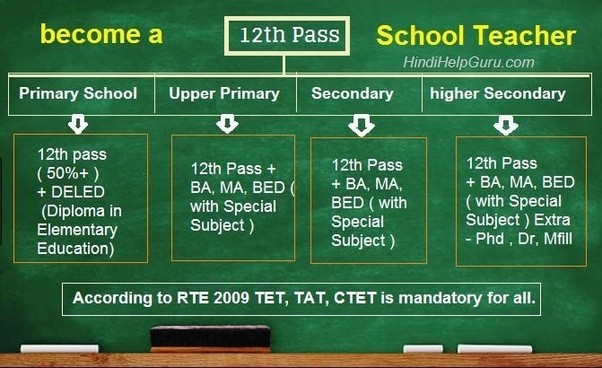B.Ed. After B.Tech / B.E. for engineering grads - Is it a good career choice?
A lot of engineering students aspire to become teachers. As some guy wisely said - In India students first become engineering graduates, and then decide what they want from their career.
Therefore, it's a phenomenon unique to India that B.E. or B.Tech graduates want to pursue career in teaching in primary-level, middle or high schools.
This might mean to some that they are leaving behind their technical careers, but it is a reality for majority and we must embrace it - till the time comes when serious amendments are made to the education system.
Students who come to big cities from remote villages for engineering have to sometimes return to their hometown because of lack of job opportunities or other responsibilities.
One of the many logical career choices for them is - going for a career in teaching.
Some would say that, getting a M.Tech degree would be the best thing to do, as most (not all) M.Tech degree holders opt for the jobs of professors in engineering colleges. However, if you ask me, I think engineering freshers teaching young school children seems like a much better picture to me than M.Tech freshers teaching B.Tech students.
So, this discussion is all about discussing opportunities of doing B.Ed. after B.Tech / B.E and how engineers can chart their paths in this territory.
Let's start with the first and foremost obvious questions -
Can I do B.Ed after B.Tech or B.E.?
Yes. Absolutely. Until 2015, some universities didn't allow B.Tech students to opt for B.Ed. courses, but now most have lifted such criteria.
For teaching primary schools the teachers require D.Ed.
For teaching secondary school onwards, the teachers require B.Ed
(As there are specific methods to teach each subject.)
Eligibility Criteria for doing B.Ed after B.Tech or B.E.
10+2 OR Graduation (B.E., B.Tech, B.Sc., B.Com, B.A) from recognised university with at least 50% marks.
You have to take the entrance exam of respective university OR college and score well to get a seat in your desired college.
Entrance Exam preparation subjects for B.Ed.
In general, you will see the following topics:
General Aptitude
Quantitative Aptitude
General Awareness
English Comprehensive
List of B.Ed. Entrance Exams
Indira Gandhi National Open University B.Ed Entrance
Uttar Pradesh B.Ed Entrance Test
Maharashtra B.Ed Entrance Exam
Delhi University B.Ed Entrance Exam
Mumbai University B.Ed Entrance Exam
Guru Nanak Dev University B.Ed Joint Entrance Test
Punjab University Entrance Exam
B.Ed Entrance Exam Pune
Chaudhary Charan Singh University B.Ed Entrance Exam
Kerala B.Ed Entrance Exam
... There are many other top colleges and it is recommended that you take the B.Ed exam in your place of convenience.
That's all for now. I will update the discussion with more information. If you have any questions or have something to add to this, please post below.
Update: Pros and Cons of Career in Teaching for Engineers
Choosing a career path is a highly individual decision, influenced by one's skills, interests, values, and career goals. If you're considering a Bachelor of Education (B.Ed) after a Bachelor of Engineering (B.E) or Bachelor of Technology (B.Tech), it seems you're interested in combining your technical knowledge with education. Let's break this down from multiple angles:
Pros of B.Ed after B.E/B.Tech:
1. Utilisation of technical expertise: You can utilise your technical knowledge to teach and inspire future generations of engineers and technologists.
2. Growing demand for STEM educators: There's a high demand for educators in Science, Technology, Engineering, and Math (STEM) fields. With a B.E/B.Tech and a B.Ed, you would be well-equipped to meet this demand.
3. Work-life balance: Teaching often provides a more predictable and balanced schedule than many corporate jobs.
4. Job satisfaction: If you have a passion for teaching, the joy of imparting knowledge and shaping the lives of young minds can lead to high job satisfaction.
Cons of B.Ed after B.E/B.Tech:
1. Potential lower initial earnings: Teachers' salaries may be lower than what engineers can earn in corporate roles, especially in the initial years.
2. Additional years of study: Pursuing a B.Ed requires additional time investment and potentially additional financial costs for tuition and other expenses.
3. Transition challenges: Transitioning from an engineering to an educational environment can be challenging. You will need to adapt your communication skills to be effective in the classroom, which can be quite different from a corporate or technical setting.
4. Pressure and stress: Despite the potential for work-life balance, teaching can be stressful due to administrative pressures, managing diverse student needs, and the accountability of educational outcomes.
Other Options for Engineers in the Education Field:
1. STEM Education Consultant: Companies, non-profits, and government agencies often hire consultants to help design and implement STEM education programs.
2. Corporate Trainer: Many companies hire technical trainers to teach their employees new technologies and skills.
3. EdTech: With the rise of educational technology, there's a significant demand for individuals who understand both education and technology. Roles might include designing educational software or platforms, developing educational content, or data analysis.
4. Higher Education: Instead of teaching at the K-12 level, you might consider teaching at a community college or university. This typically requires a master’s degree or PhD, but you could also consider adjunct teaching roles or positions that value industry experience.
5. Content Creation: If you enjoy writing or creating multimedia content, you could create educational materials for textbooks, e-learning platforms, YouTube channels, etc.
I think, a B.Ed after B.E/B.Tech can indeed be a good career choice if your interests align with teaching and you're willing to face the challenges associated with it.
Ultimately, the choice depends on what you value most in your career—whether that's income potential, work-life balance, job satisfaction, or other factors.
Also, keep in mind that the field of education offers a range of roles that can leverage your engineering knowledge and skills, so teaching in a classroom isn't the only option.
I hope you find this useful. Let me know if you have further questions.





